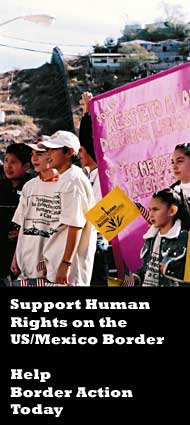Taking off from Oprah's exploration of vegetarianism, Elle, PhD and Brownfemipower over at La Chola are dialoguing about the work of, and the practical and emotional cost of, and the political meaning of going vegan as women of color.
They're talking about what it means in communities (like mine, too) where meat-eating is pretty much a given, and women's identities have been baked in the nurturance of feeding others for centuries, and where any chefs we have are in our own skins, and grocery shopping comes with enough angst already.
I don't want to characterize their conversation any further, but it talks to me, too, because in this household we're also struggling with the decision to go vegan.
So just read the originals. If you labor under any misapprehension that going vegan is just automatically taking a giant step up the moral ladder of life, let them smack you upside the head. A.F.G.O.: another fucking growth opportunity.Get this: I'm definitely not saying it's better to eat meat. I'm saying that at least for me, anyway, the way PETA and Oprah and pretty much tout le monde have framed this conversation so far, in that blindly racist and classist way we have of just not seeing, has obscured the most important ethical/moral fact of all: The way what goes on our tables degrades, brutalizes, cheats, injures, and causes other kinds of grave harm to all the workers who get it there.
I'm saying that acting in behalf of animals who are subjected to atrocities so that we might eat is moral, ethical, and principled, but it only goes halfway. It isn't the whole conversation.
I might say, "How did I miss that part about how a vegan diet depends every bit as much on worker exploitation as a meat diet!," except that I know how I missed it. I haven't been thinking about it, and that's a damning indictment of my own racist, classist, blind-way-of-not seeing privilege. I haven't used my eyes or my brain, which leads me still yet again one more time to reflect on the nature of "sin" again--namely, that it happens primarily when we just aren't paying attention to others.
Instead of paying attention myself, I've been content to let the "prevailing conversation," the one that makes it onto the self-help bookshelves, frame the whole thing for me.
But I'm not knocking Oprah. Since when does she have to be perfect in order to make a point worth making? I too feel pretty good that she's taking animal suffering to another level of national consciousness, except that (as you know if you read Wild Chi), I definitely do not think PETA is St. Francis of Assisi by about a trillion miles. About that more some other day.
Meanwhile, thanks to Elle and BFP, I now see in my mind's eye a holy communion meal at which we all KNOW--I mean really KNOW--that not one single bite of anything goes into our mouths that hasn't been sanctified by the blood, sweat, and tears of a picker, a hanger, a packer somewhere, who might be 11 years old or 82, and by the suffering of the animal and sacrifice of the plant that it comprises.
OK I feel a little odd talking about plants' sacrifices over against humans' and animals. I know the story about the pig and the hen: When it comes to breakfast, the pig makes the commitment. But maybe I don't know what plants experience. There's that, but more important still, is this: Since we really are all connected, it really isn't possible to eat without exploiting somebody unless we grow our own. And even then, somebody got paid a low wage to work in miserable conditions to harvest and pack these seeds or the fruit they came from.
So the point for me this minute--it could change because I'm thinking about this--is partly that it's futile to look for the perfectly ethical menu, there being no such thing. Rather, choose my path and be mindful of what I eat and how it comes to me.
Own the debt. It's not just about changing diets. It's about changing industries, wages, working conditions, immigration paths, global trade treaties, and stepping out of the hierarchical, patriarchal way of looking at women and people of color and animals and Earth and, yes, even plants. It's about a whole-life stance, not about what goes on the plate.
So.
This from Elle:
So, a number of things have me thinking about vegetarianism/veganism. One, as noted above, are the thoughtful discussions BFP has about potentially becoming a veg*n.
Another is the nature of my work. Invariably, when I talk about my dissertation, I talk about conditions in poultry processing plants. For the workers, there is exhausting, dirty work, at unbelievable speeds. There is routine underpayment of wages. There are supervisors who treat you as if you are nothing. There is the huge company that will do almost anything--legal or extralegal--to keep workers from organizing. There is the exploitation of the most vulnerable workers. There are the "chicken" rashes, bone splinters, musculoskeletal disorders, cumulative trauma disorders, cuts and amputations, slippery, fat-slick floors, extreme temperatures, dealing with frightened, live chickens and dead ones that rest in a "fecal soup."
Here are the hands of a 22-year old man who works in live hang.
And this from Brownfemipower:
"Dr. Elle talked a lot about the connection she and her family/community has to meat plant workers. She had a picture of the hands of a 22 year old worker and she talked about how wounds and accidents that happen in the plant have led people she knows to do horrible things to the animals that work there (one took out a knife and stabbed the animal).
"Her discussion brought back so many memories to me–memories that I’m not even sure are mine, but sit in my body anyway.
"* My father was a strawberry picker (among other things). He worked on his hands and knees for hours and hours, days and days, weeks and weeks at a time. As a child, when I heard the stories, I imagined my fully grown father with his wide shoulders and strong legs competently stripping berries from plants–just like he did when he and I picked blueberries. As an older woman, I realize now that he was only a kid in those stories. Younger than I was when I started working in the fields (11 yrs.).
To this day, I avoid blueberries. And bananas make me sick. How much blood of the murdered flows through the flesh of bananas? How many years of lost childhood flow through the skin of poisoned blueberries/strawberries/tomatoes/grapes….?
"Is a vegan lifestyle really a 'cruelty free' lifestyle? Why is it so easy to prioritize cruelty inflicted on animals over cruelty inflicted on brown people? Why can people list a whole litany of wrongs committed against animals by the food industry–but at the same time those people “never really thought” about what happens to the workers?
"Should I consider these things while contemplating veganism? Should I mourn them?
"Can I bring myself to say with a straight face that I no longer eat meat because I care about ending violence against animals? Can I say to the workers, to myself, that even animals are more important to me than they are, than I am? Can I continue my own people’s erasure? Can I continue mine?
"How do I make eating vegan/vegetarian a political choice about liberation without making the sacrifice one set of beings make with their bodies more important than another set of beings?"



















2 comments:
I'm a vegan and I know it's not fair to say a vegan lifestyle equals a cruelty free lifestyle. However, it is a good step in the right direction.
We could argue that removal of meat form our diets removes jobs too - jobs often worked by migrants just as we can argue that farm workers are exploited just as much as the animals raised for meat. Of course animals die when farm equipment rumbles down the fields as well. Unfortunately no situation is perfect.
I think the idea is to move toward a better world where we don't have to weigh out the idea of veganism because exploitation is so rampant that you might as well eat meat. We are fighting here for human rights and the basic rights of all living beings. To me the idea that animals should be given the same treatment is important too.
We may never create a perfect world, but bit by bit we can work towards that goal. This blog and you dedication are a wonderful example of this. Without your hard work we'd all be that much worse off.
Thank you for your kind comments.
I hope nothing I wrote gave the impression that I am anti-vegan! What I've come to, rather, is that vegan is a step forward, but that no menu choice is morally neutral. Instead, morality, to me--and this is just me--lies in owning the debt I have to the workers who feed me. This means I am obligated to fight for worker rights and justice for all workers, and because immigrants more than anyone provide my food, I am particularly obligated to oppose nativist-racist anti-migrant hate and to support justice for migrants and a fair, compassionate, and efficient immigration system. My choice is to work with Interfaith Worker Justice-AZ. I'om on its board and very active in both worker rights and immigrant rights issues.
Thank you again for your thoughtful comment. Please come back and comment often!
Post a Comment